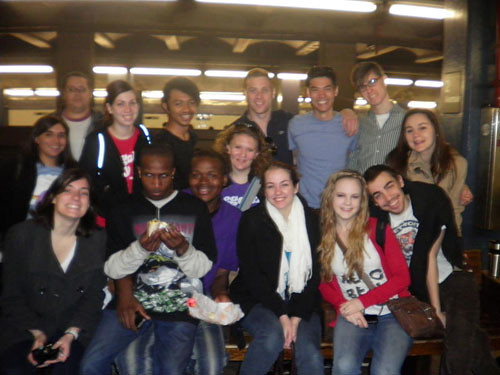 Jim Hohl A group of university students on an alternative spring break, volunteering with New Alternatives, with some of the organization’s LGBT homeless youth.
Jim Hohl A group of university students on an alternative spring break, volunteering with New Alternatives, with some of the organization’s LGBT homeless youth.Robert Smith, 24, describes his childhood as magical. Growing up in Myrtle Beach, S.C., Mr. Smith had everything a child could ever ask for — European vacations, the latest gadgets and even a hefty trust fund.
“I was a platinum-spooned, spoiled rotten trust fund baby,” said Mr. Smith with a grin. “Anything that someone could possible want, I had.”
But when Mr. Smith turned 19, that all changed. After coming out to his family, his grandmother cut him off financially, removing him from her will because she would no longer support his lifestyle. After spending several years moving around the south, Mr. Smith, who had just been kicked out of his older brother’s apartment, booked a flight and headed to New York.
“After paying for the flight and my hostel stay, I only had $55 in my pocket,” said Mr. Smith. “When I couldn’t afford the hostel anymore, I went to the Street Works Project and stayed in their emergency beds for about a week. From there, I went to Sylvia’s Place for three weeks before heading to Trinity Place Shelter for a year, where I attended the Back to Work Program and got my life together.”
Mr. Smith is now the executive assistant to the chief operating officer at a computer analyst company, and it’s a title he says with pride. But there’s another organization that he credits for his success — New Alternatives for LGBT Homeless Youth.
Founded in 2008 by LGBT rights activist Kate Barnhart, New Alternatives, located on East Seventh Street between First and Second Avenues, is a drop-in program that aims to increase the self-sufficiency of LGBT homeless youth.
“Homeless LGBT youth, and especially transgender youth, are arguably the most marginalized population,” said Ms. Barnhart. “They are already marginalized being homeless, but then you add being queer, being transgender, being young, being a person of color, and there’s a 20 percent HIV infection rate in this population, so when you add all of these different factors, they start to pile up. This attributes to these young people really being in a crisis state.”
Unlike other LGBT homeless youth programs, like those offered at Sylvia’s Place and The Ali Forney Center, New Alternatives employs the principles of harm reduction, providing several unique services to its young clients, who range in age from 14 to 24. Most government-funded services are required to close their doors to those over the age of 21.
“A lot of our young people have been traumatized, and trauma tends to affect people’s development,” said Ms. Barnhart. “So even though someone may be in their twenties, psychologically, they’re at a much younger age in their development, and they still need a lot of support. So we offer that to them.”
Although New Alternatives is not a LGBT youth homeless overnight shelter, it offers shelter referrals, weekly life skills sessions, where volunteers lead discussions on issues ranging from HIV and suicide to how to get a job, and case management counseling, where homeless LGBT youth, many of whom don’t have access to their state identification cards, birth certificates or other official documents, can receive legal and financial assistance for obtaining new documents.
“A lot of times when your parent beats you up and says, you’re gay, get out of my house, they don’t pack up your birth certificate and send it with you,” says Barnhart. “But in order to get Medicaid or enroll in school, you need those documents, so we facilitate that process. We have something called the youth emergency fund for these cases.”
However, New Alternatives is a small-staffed operation, relying mostly on donors and federal grants to help pay for everything from new clothes for their young clients, to school fees and hygiene supplies. And Ms. Barnhart tends to take on the brunt of the work on her own, even though the former Act Up activist suffers from several chronic illnesses herself, including lupus and a pituitary tumor in her brain, and spends the majority of her time caring for her elderly father, who suffers from Alzheimer’s disease.
But that doesn’t stop Ms. Barnhart from focusing on the 200 or so LGBT homeless youth that need her most.
Like Vincenzo Alexander, one of her clients who just completed his first semester at Hampshire College. Mr. Alexander was forced to drop out of college and became homeless when his parents disowned him after he came out as transgendered, but now he has a second chance thanks to the efforts of Ms. Barnhart and New Alternatives.
“I learned from the guys in Act Up,” said Ms. Barnhart. Many of them were living with AIDS and in poor physical health, but they still fought for what was right. These kids need a place to go. They need help. And most of all, they need support — they need to know they’re not alone.”




